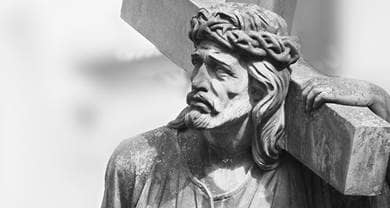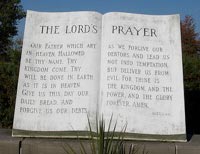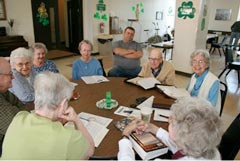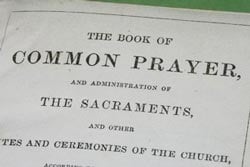- Trending:
- Forgiveness
- |
- Resurrection
- |
- Joy
- |
- Afterlife
- |
- Trump

RELIGION LIBRARY
Christianity
Worship and Devotion in Daily Life
This article will introduce some Christian practices that are broadly applicable to multiple traditions. The daily practices of prayer, devotion, and study vary significantly between denominations and will be described in the articles on those traditions.
Christians, like Jews and Muslims, seek God in their daily lives through prayer and the study of scripture. Filled with promises of blessings to those who pray in a manner acceptable to God, the New Testament strongly encourages prayer, providing both instructions and examples. The Gospel of Matthew contains an example of prayer that Jesus gave to his followers, setting the pattern for how to pray and what to pray for:
This, then, is how you should pray:
Our Father in heaven,
hallowed be your name,
your kingdom come,
your will be done
on earth as it is in heaven.
Give us today our daily bread.
Forgive us our debts,
as we also have forgiven our debtors.
And lead us not into temptation,
but deliver us from the evil one (Matthew 6:9-13).
 Famously known as the "Lord's Prayer," this short text, containing many of the fundamental assumptions of Christianity, is the most influential prayer for Christians. They should approach God as a child approaches a parent, with simplicity and directness, in confidence and in love. The will of the Christian is subordinate to the will of God, and the immediate needs of the Christian are subordinate to a devout longing for God's reign.
Famously known as the "Lord's Prayer," this short text, containing many of the fundamental assumptions of Christianity, is the most influential prayer for Christians. They should approach God as a child approaches a parent, with simplicity and directness, in confidence and in love. The will of the Christian is subordinate to the will of God, and the immediate needs of the Christian are subordinate to a devout longing for God's reign.
The Lord's Prayer teaches the Christian to ask for physical and spiritual goods, but only after praying that God will bring about the supreme end that God seeks. Prayer must not be selfish. The Gospel of Luke tells how Jesus followed these spiritual principles until his death. When he prayed that he might be saved from his impending arrest and crucifixion, he concluded by saying, "Father, if you are willing, take this cup from me; yet not my will, but yours be done" (Luke 22:42).
 The first Christians were devout Jews who observed the Jewish practice of daily prayer at specific times. The Books of Acts tells us that the apostles prayed three times a day: at the third, sixth, and ninth hours (9 a.m., 12 noon, and 3 p.m.). At these same hours, early Christians also said private devotions at home. When possible, Christians gathered in the morning and evening for public prayers. By the 10th or 11th century, a tradition of brief devotional prayers called "the Hours" had developed among the clergy and soon became popular with lay Christians. The churches of the Protestant Reformation simplified these prayer services, although some churches abolished them outright in favor of informal prayer. Liturgically-minded Lutherans and Anglicans retained both morning and evening prayer.
The first Christians were devout Jews who observed the Jewish practice of daily prayer at specific times. The Books of Acts tells us that the apostles prayed three times a day: at the third, sixth, and ninth hours (9 a.m., 12 noon, and 3 p.m.). At these same hours, early Christians also said private devotions at home. When possible, Christians gathered in the morning and evening for public prayers. By the 10th or 11th century, a tradition of brief devotional prayers called "the Hours" had developed among the clergy and soon became popular with lay Christians. The churches of the Protestant Reformation simplified these prayer services, although some churches abolished them outright in favor of informal prayer. Liturgically-minded Lutherans and Anglicans retained both morning and evening prayer.
 In modern life, many churches no longer offer daily services, but the tradition of private devotion continues. Many Christians set aside daily family time, usually in the evening, for prayer and scripture reading. Small groups meet in the home for Bible study. Christians often pray upon waking and at bedtime. Prayers of thanksgiving are said at mealtime. Christians pray on behalf of the sick and visit the sick in order to pray with them. Christian expressions of devotion also include helping at soup kitchens or shelters, visiting prisons, assisting with cleaning up and rebuilding after natural disasters, and volunteering in hospitals, nursing homes, and hospice care.
In modern life, many churches no longer offer daily services, but the tradition of private devotion continues. Many Christians set aside daily family time, usually in the evening, for prayer and scripture reading. Small groups meet in the home for Bible study. Christians often pray upon waking and at bedtime. Prayers of thanksgiving are said at mealtime. Christians pray on behalf of the sick and visit the sick in order to pray with them. Christian expressions of devotion also include helping at soup kitchens or shelters, visiting prisons, assisting with cleaning up and rebuilding after natural disasters, and volunteering in hospitals, nursing homes, and hospice care.
 As aids to prayer and the study of scripture, devotional books are very popular with Christians. Some examples include the Anglican Book of Common Prayer, the Lutheran Book of Prayer, The Imitation of Christ by Thomas à Kempis, The Cost of Discipleship by Dietrich Bonhoeffer, The Screwtape Letters and other titles by C.S. Lewis, and The Purpose-Driven Life by Rick Warren.
As aids to prayer and the study of scripture, devotional books are very popular with Christians. Some examples include the Anglican Book of Common Prayer, the Lutheran Book of Prayer, The Imitation of Christ by Thomas à Kempis, The Cost of Discipleship by Dietrich Bonhoeffer, The Screwtape Letters and other titles by C.S. Lewis, and The Purpose-Driven Life by Rick Warren.  These books extend and deepen the personal and communal lives of Christians by supplementing their daily prayers with alternative prayers, Bible meditations, and reflections on the meaning of Christian life and identity.
These books extend and deepen the personal and communal lives of Christians by supplementing their daily prayers with alternative prayers, Bible meditations, and reflections on the meaning of Christian life and identity.
Inspired by the Bible's instruction to "pray always," Christians developed meditations, such as the practice by Russian monks of repeating a prayer hundreds of times daily in order to integrate the prayer into their breathing. Greek monks practiced sitting quietly, guiding their consciousness inward to experience the inner light of God. Monks in Egypt would slowly recite the psalms, reflecting on the most meaningful verses. In Europe during the Middle Ages, the practice of walking meditation developed around the labyrinth-like patterns that were designed into the tile and stone floors of the great cathedrals, a practice now enjoying resurgence. In recent years, the practice of centering prayer has become quite popular. The practitioner sits comfortably and quietly, continually repeating a single word such as "love," "light," or "peace" until thoughts flow away and the practitioner feels a deep sense of stillness and rest.
Through many styles of prayer, Bible readings, study, and devotional action, Christians respond to the New Testament's call to prayer, to sanctify daily life by spending it closely aligned with God.
Study Questions:
1. How do Christians structure their prayer? What does it reveal about the relationship they have with God?
2. When do Christians pray? Why does it vary?
3. Name three contemporary aids to prayer. How are they used?










